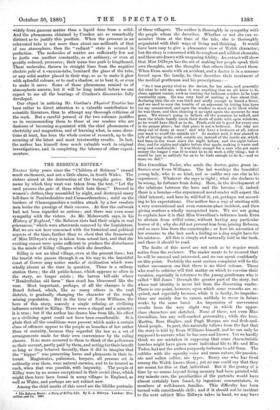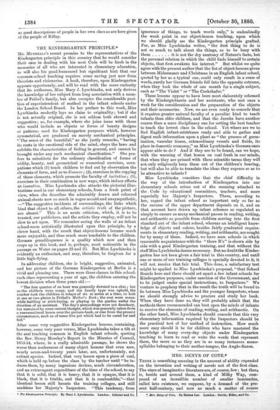THE REBECCA RIOTER.*
NEARLY forty years since the "Children of Rebecca" caused much excitement, and not a little alarm, in South Wales. The rioters aimed at the destruction of the turnpike gates. Whe name by which they went was taken from the text, "Let thy seed possess the gate of them which hate them." Dressed in women's clothes, they assembled by night, and destroyed many toll-bars in Pembrokeshire and Carmarthenshire ; until on the borders of Glamorganshire a sudden attack by a few resolute men broke the prestige of their success. At first the outbreak had not been regarded as serious ; and there was even some sympathy with the rioters. As Mr. Molesworth says, in his History of England," the Rebecca riots had their origin in real grievances," which were afterwards removed by the Legislature. But we are not here concerned with the historical and political aspects of the time, further than to show that the framework of Miss Dillwyn's story is taken from actual fact, and that the exciting causes were quite sufficient to produce the disturbance in the minds of Killay villagers which she describes.
Killay is not an ideal village, even at the present time ; but the tourist who passes through it on his way to the beautiful coast of Gower may notice marks of civilisation which were wholly absent at the time in question. There is a railway station there ; the old public-house, which appears so often in the story, no longer exists ; the barren hill-side where " Hendrefoilan old farm" then stood has blossomed like the rose. Most important, perhaps, of all the changes is the Board School, which, like so many others in the coal district, is gradually changing the character of the rough mining population. But in the time of Evan Williams, the hero of this story, scarcely a single refining or civilising influence existed in Killay. There were a chapel and a minister, it is true ; but if the author has drawn him from life, his effect as a civilising agent could not have been considerable. It is plain that all the conditions were present which make a certain class of offences appear to the people as breaches of law rather than of morality, because they regarded the law as a set of arrangements made for their own convenience by the ruling classes. It no more occurred to them to think of the policeman as their servant, partly paid by them, and acting for their benefit so long as they behaved decently, than it did to imagine that the " kipper " was preserving hares and pheasants in their in- terest. Magistrates, policemen, keepers, all persons set in authority over them, were natural enemies, and to be treated as such, when that was possible, with impunity. The people of Killay were by no means exceptional in their social ideas, which might then have been found in many villages in England, as well as Wales, and perhaps are not extinct now.
Among the chief merits of this novel are the lifelike portraits
* The Rebeeta Rioter: a Story of Killay Life. By E. A. DBIwyn. London: Mac- millan and Co. 1880.
of these villagers. The author is thoroughly in sympathy with the people whom she describes. Whether or not she can re- member them at the time of the tale, she is thoroughly acquainted with their ways of living and thinking. It would have been easy to give a pleasanter view of Welsh character; but the story is concerned with its roughest and wildest elements, and these are drawn with unsparing fidelity. An extract will show that Miss Dillwyn has the art of making her people speak their own thoughts, not the thoughts that others think about them. When Evan meets with an accident, and a doctor is in a manner forced upon the family, he thus describes their treatment of the medical gentleman and his prescriptions :—
"So I was pretty civil to the doctor, for her sake, and generally did what he told me, unless it was anything that we all knew to be clean against reason, such as wanting the bedroom window to be kept constantly open. He was very fond of making a fuss about that, declaring that the air was thick and stuffy enough to breed a fever, and we used to save the trouble of an argument by letting him have his say unanswered, and open the window as much as he liked whilst he was there, and then shutting it up tight again the moment he was gone. We weren't going to believe all the nonsense he talked, and have the whole family catch their death of colds with open windows, as he would have liked us to do. Fresh, cold air is good for every one in its proper place ; but that place is not a bedroom. For why not sleep out of doors at once ? and why have a bedroom at all, unless you want to avoid the outside air ? As mother said, it was' absurd to talk of letting in the cold, outside air, instead of the inside air, which had been in the room since the night before, and the night before that, and for nights and nights before that again, making it warm and snug and comfortable ! It was likely enough for a man who got more money the longer I was ill to want us to do such a silly thing ; but it would be just as unlikely for us to be fools enough to do it,—and no more we did."
Miss Gwenllian Tudor, who sends the doctor, gains great in-
fluence over Evan Williams. The lad worships the beautiful young lady, who is so kind, and so unlike any one else in his experience. Whatever she says is right ; what she declares to
be wrong, he forbears from doing. Here, in the development of the relations between the hero and the .heroine—if, indeed, there is a heroine—the experienced novel-reader will expect the chief interest; and here he will find it, yet, perhaps, not accord-
ing to his expectations. Our author has a way of starting with a very conventional and even common-place incident, and then giving matters a wholly unexpected turn. We are not going to explain how it is that Miss Gwenllian's influence leads Evan to abstain from wilful crime, without having any particular horror of it; why she did not prevent him from joining Rebecca, and so save him from the catastrophe ; or how his adoration of her remains to the last such a feeling as a dog might have for his mistress. All this is simply and naturally told in the book, and there it should be read.
The faults of this novel are not such as to require much notice from the reviewer. The reader wants to be assured that he will be amused and interested, and we can speak confidently on this point. Probably the most serious complaint will be the rather uncommon one that there is no third volume. Those who read to criticise will find matter on which to exercise their vocation, especially in reference to the young gentleman who is called "Bill Jones" through the greater part of the story, but whose real identity is never hid from the discerning reader. There is one point, however, upon which some remarks are re- quired, and especially because, while it is faulty, its imperfec- tions are mainly due to causes unlikely to recur in future works by the same hand. An impression of unevenness results from the very slight way in which the upper- class characters are sketched. None of these, not even Miss Gwenllian, has any well-marked personality ; while the hero, Martha, Rees Hughes, and Pugh Morgan are real flesh-and- blood people. In part, this naturally follows from the fact that the story is told by Evan Williams himself, and he can only be supposed to narrate what he has seen and known. Yet we hardly think we are mistaken in supposing that some characteristic touches might have given more individual life to Mr. and Miss Tudor, had not the author purposely forborne to add them. The cobbler with the squeaky voice and mean nature, the passion- ate and sullen collier, are types. Every one who has lived among the Welsh knows them ; yet no one could say that they are meant for this or that individual. But if the gentry of a time by no means beyond living memory had been painted with any minute care, the peculiarities of the portraits would have almost certainly been found,. by ingenious commentators, in members of well-known families. This difficulty has been turned with considerable skill ; and if it should not be incident to the next subject Miss Dillwyn takes in hand, we may have as good descriptions of people in her own class as are here given of the people of Killay.







































 Previous page
Previous page